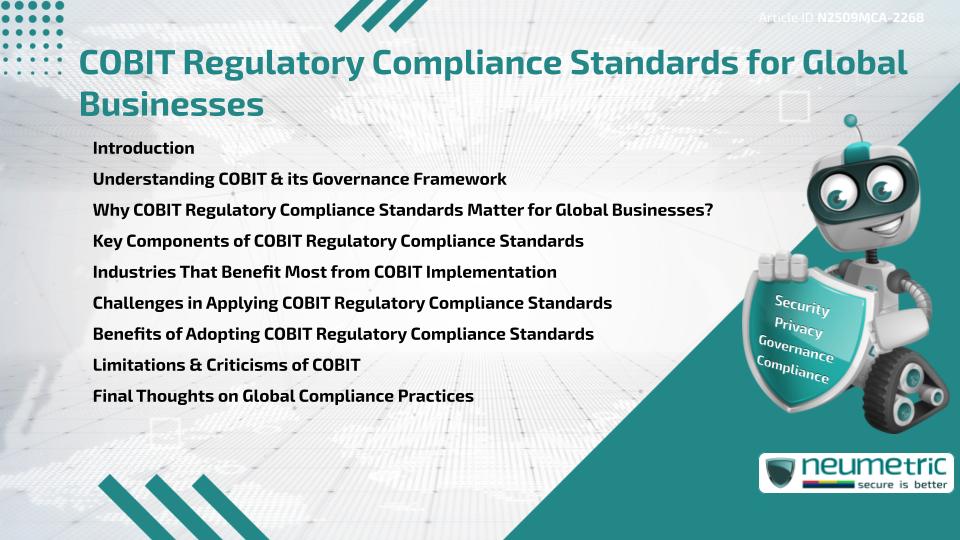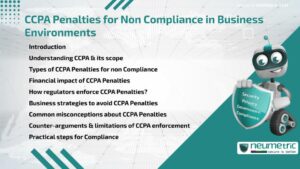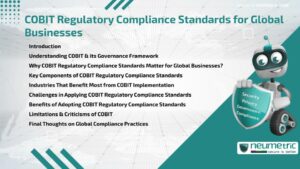Table of Contents
ToggleIntroduction
In today’s interconnected world, Organisations must balance business growth with effective Governance, Risk Management & Regulatory Compliance. COBIT [Control Objectives for Information & Related Technology] provides a widely recognised Framework to achieve this balance. For global enterprises, COBIT Regulatory Compliance Standards serve as a structured approach to aligning IT operations with legal, financial & industry requirements. This article explores the fundamentals of COBIT, its components, practical applications & its role in shaping Compliance practices across industries.
Understanding COBIT & its Governance Framework
COBIT, originally developed by ISACA, is a Governance Framework designed to help businesses manage & control their information technology systems. It combines Best Practices, Tools & Methodologies for Governance & Management of enterprise IT.
Unlike purely technical frameworks, COBIT connects IT goals with Organisational Objectives, ensuring Compliance while improving operational efficiency. This makes it particularly valuable for multinational companies operating across multiple regulatory environments.
Why COBIT Regulatory Compliance Standards Matter for Global Businesses?
Global businesses face an increasingly complex Compliance environment. Regulations such as GDPR, SOX [Sarbanes-Oxley Act] & HIPAA impose strict requirements on data handling, reporting & security.
COBIT Regulatory Compliance Standards offer a unified structure to meet these diverse obligations. By adopting COBIT, Organisations can:
- Standardise Compliance practices across regions.
- Reduce duplication of efforts in meeting different Regulatory requirements.
- Improve Transparency in IT Governance.
- Strengthen Trust with Regulators, Stakeholders & Customers.
Key Components of COBIT Regulatory Compliance Standards
The Framework includes several core elements designed to guide Organisations:
- Governance Objectives – Define how business goals align with IT Governance.
- Management Objectives – Provide actionable processes for IT service delivery & Risk Management.
- Performance Metrics – Establish measurable indicators to track Compliance & Governance effectiveness.
- Process Practices – Offer detailed guidance for implementing IT Controls.
- Maturity Models – Help Organisations assess current Compliance levels & plan improvements.
Together, these components form a comprehensive toolkit for global Compliance management.
Industries That Benefit Most from COBIT Implementation
While COBIT applies to all sectors, certain industries gain exceptional value from COBIT Regulatory Compliance Standards:
- Financial services – Ensures strong Governance to meet SOX & Basel III requirements.
- Healthcare – Aligns IT controls with HIPAA & Data Protection rules.
- Technology & Telecom – Manages Risks associated with large-scale IT systems.
- Manufacturing & Logistics – Ensures Compliance with International trade & Supply chain regulations.
These industries, operating under heavy regulatory scrutiny, leverage COBIT to harmonise Compliance efforts globally.
Challenges in Applying COBIT Regulatory Compliance Standards
Despite its effectiveness, implementing COBIT presents several challenges:
- Complexity – The Framework can be overwhelming for smaller enterprises with limited resources.
- Customisation Needs – Businesses must tailor COBIT to fit specific industry & regional regulations.
- Change Management – Shifting organisational culture to adopt Governance frameworks can be difficult.
- Cost – Implementing COBIT at scale may require significant investment in training & technology.
Benefits of Adopting COBIT Regulatory Compliance Standards
The advantages of adopting COBIT Regulatory Compliance Standards far outweigh the challenges. Benefits include:
- Streamlined Compliance – Easier to meet multiple regulatory obligations with one structured Framework.
- Improved efficiency – Clear processes reduce wasted effort & duplication.
- Enhanced decision-making – Better alignment between IT Governance & Business Objectives.
- Global consistency – A standardised approach ensures Compliance across jurisdictions.
- Audit readiness – Documentation & Metrics simplify Audit & Reporting processes.
These benefits demonstrate why COBIT is considered a trusted Governance Framework worldwide.
Limitations & Criticisms of COBIT
Like any Framework, COBIT has limitations. Common criticisms include:
- It may be too complex for smaller Organisations.
- Implementation costs can be high, particularly for global enterprises.
- It requires ongoing updates to remain relevant in fast-changing regulatory landscapes.
- It may not fully address industry-specific requirements without additional frameworks.
To mitigate these issues, businesses often combine COBIT with other Standards such as ITIL or ISO 27001.
Final Thoughts on Global Compliance Practices
For global enterprises, COBIT Regulatory Compliance Standards offer a proven roadmap to achieve strong Governance, manage Risks & comply with diverse Regulations. When applied effectively, COBIT enhances operational Transparency, fosters Trust & ensures Organisations remain competitive in a Compliance-driven marketplace.
Takeaways
- COBIT provides a comprehensive Governance Framework for IT & Compliance.
- COBIT Regulatory Compliance Standards help align IT operations with global regulations.
- Key elements include Governance objectives, Performance metrics & Maturity models.
- Industries like Finance, Healthcare & Technology gain exceptional value.
- Despite challenges, COBIT delivers efficiency, consistency & Audit readiness.
FAQ
Do all businesses need to follow COBIT?
No, COBIT is not mandatory, but it is widely adopted by global enterprises seeking structured Compliance.
How does COBIT differ from ITIL?
While COBIT focuses on Governance & Compliance, ITIL emphasises service management & operational processes.
What industries use COBIT Regulatory Compliance Standards the most?
Financial services, Healthcare, Technology & Manufacturing are among the top adopters.
What are the main challenges of COBIT adoption?
Challenges include complexity, high implementation costs & the need for organisational change management.
Can COBIT be combined with other frameworks?
Yes, many Organisations combine COBIT with ITIL, ISO 27001 or NIST guidelines for a more complete Compliance strategy.
Need help for Security, Privacy, Governance & VAPT?
Neumetric provides organisations the necessary help to achieve their Cybersecurity, Compliance, Governance, Privacy, Certifications & Pentesting needs.
Organisations & Businesses, specifically those which provide SaaS & AI Solutions in the Fintech, BFSI & other regulated sectors, usually need a Cybersecurity Partner for meeting & maintaining the ongoing Security & Privacy needs & requirements of their Enterprise Clients & Privacy conscious Customers.
SOC 2, ISO 27001, ISO 42001, NIST, HIPAA, HECVAT, EU GDPR are some of the Frameworks that are served by Fusion – a SaaS, multimodular, multitenant, centralised, automated, Cybersecurity & Compliance Management system.
Neumetric also provides Expert Services for technical security which covers VAPT for Web Applications, APIs, iOS & Android Mobile Apps, Security Testing for AWS & other Cloud Environments & Cloud Infrastructure & other similar scopes.
Reach out to us by Email or filling out the Contact Form…





